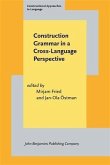Twenty-one articles from the 31st LSRL investigate cutting-edge issues and interfaces across phonology, pragmatics, sociolinguistics, semantics, and syntax in multiple dialects of such Romance languages as Catalan, French, Creole French, and Spanish, both old and modern. Research in Romance phonology moves from the quantitative and synchronic to cover issues of diachrony and Optimality theory. Work within pragmatics and sociolinguistics also explores the synchronic/diachronic link while topicalizing such issues as change of non-pro-drop Swiss French toward pro-drop status, scalar implicatures, speech acts, word order, and simplification in contexts of language contact. Finally, debates in linguistic theory are resumed in the work on syntax and semantics within both a Minimalist perspective and an Optimality framework. How do Catalan and French children acquire AGR and TNS? Can Basque Spanish be compared to topic-oriented Chinese? If Spanish preverbal subjects occur in an A-position, can Spanish no longer be compared to Greek?
Dieser Download kann aus rechtlichen Gründen nur mit Rechnungsadresse in A, B, BG, CY, CZ, D, DK, EW, E, FIN, F, GR, HR, H, IRL, I, LT, L, LR, M, NL, PL, P, R, S, SLO, SK ausgeliefert werden.









